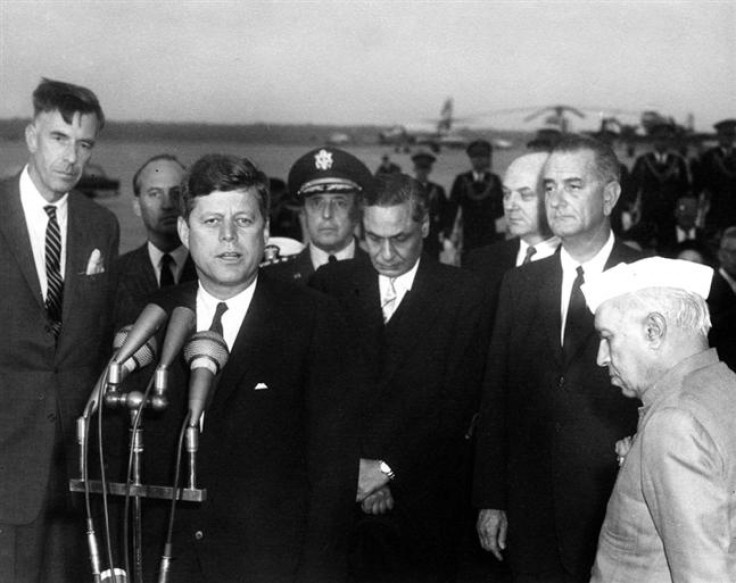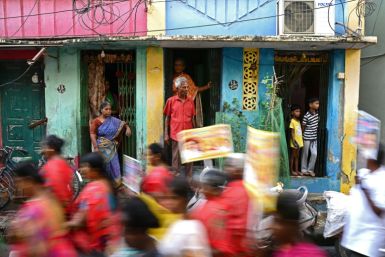November 1961: John F. Kennedy Welcomes India’s Jawaharlal Nehru To U.S. (FULL-TEXT)

On Nov. 6, 1961, U.S. President John F. Kennedy welcomed Indian Prime Minister Jawaharlal Nehru and his daughter, Indira Gandhi, at Andrews Air Force Base, for an official state visit. These were their remarks on that day*:
KENNEDY: “Prime Minister [Nehru], Madame [Indira] Gandhi, Foreign Minister [M.J. Desai], members of the Indian Cabinet: I wish to express, Prime Minister, on behalf of the people of the United States, our great satisfaction in welcoming you once more to our country, which you have visited in earlier days. Some national leaders, and it is a source of pride to us as Americans that some American leaders, have had their fame and their reputation spread across their national frontiers and boundaries, and their reputation and the affection in which they are held have become world-wide- -- [Abraham] Lincoln, [Franklin Delano] Roosevelt, our earlier leaders.
And you, Prime Minister, and your illustrious leader in the fight for Indian independence, Mahatma Gandhi, your reputation, the things for which you have stood, things with which you've been identified in your long career -- all these have spread your fame and your reputation beyond the borders of your own country and have been identified with the great aspirations of people all over the world.
India and America are separated by half the globe, but I think that you are aware, as you surely must have been aware, during the long days of your struggle for independence, of the great well of affection and regard for which your country and people are held in this country -- a great affectionate regard which belongs to you particularly in these difficult days. So, Prime Minister, we welcome you here to the shores of this country as a friend, as a great world leader, as one who has in his own life and times stood for those basic aspirations which the United States stands for today. Prime Minister, you are most welcome here to this country and we hope that when you leave you will find a renewed sense of vigor and purpose here in the United States. Prime Minister, we are glad to see you again.
NEHRU: "Mr. President, Mrs. Kennedy, I feel deeply honored and happy to be here again, and to receive this great welcome from you. More particularly not for the formal side of it but for the friendship which animated your words. You have been good enough in the past also to refer to my country in terms which evoke a warm response in our hearts. "This is the' fourth time I have come to the United States, and whenever I have come here I have been deeply impressed not only by the magnificent achievements of this great country but, if I may say so, even more so by the popular goodwill and friendship that I met everywhere here. "You have referred, sir, to our struggle for freedom.
Many countries have struggled for freedom and achieved it. Your own great country was nurtured in freedom and has grown up in that great tradition. In our struggle, as you yourself just mentioned, those leaders who built up this country in the past, and even in the recent past, we were influenced by them, and I think going back to what we used to say in those days, we often refer to them and to the achievements of this country. "And so when I came here first some 12 years ago, I came with great expectations and fulfilled a long-felt desire of my heart. Those expectations were realized and I went away with greater admiration for the achievements of this country, and with a feeling of almost- -- if I may say so -- warm and personal friendship. They have persisted. Because the relationships of countries are more basic, I think, or should be more basic than temporary political events that happen. If they have that basic quality, they can subsist.
"And so I came again on two or three occasions, and every time I was happy that I came, and renewed old friendships and made new ones. This time this is a very special pleasure for me to come, to have occasion and opportunity to talk to you, Mr. President, to understand many things, and to some extent to explain what we have on our own minds. "Your nation was nurtured in liberty. So also ours, and in a peculiar way rather unlike other countries, in the sense that we had a peculiar leader, to whom you were pleased to refer, Mahatma Gandhi. And our struggle for freedom as always everywhere conditioned us, and Mr. Gandhi's message and the training he gave us also conditioned us. I do not presume to say that we stood up to his teaching, but anyhow it was always on our minds and still continues on our minds, and to some extent still conditions us.
"And among the things that he laid great stress on, as you no doubt know, Mr. President, was on peace and peaceful methods of approach to problems. Even in our struggle with the British Empire of those days we adhered to peaceful methods. And so as a result we were fortunate at the end of that struggle when we achieved freedom to do so in friendship with the British people. The past is not only forgotten, of course, but does not come in the way of our friendly relations with the British people today. That was largely, I think, the result of the whole peaceful approach to those problems and our deliberate attempt not to pile up a mountain of bitterness over the past.
"We face mighty problems in the world today, and you, Mr. President, bear perhaps the greatest responsibility in this world. And so we look up to you and to your country, and seek to learn from you, and sometimes also to express what we have on our minds, so that we can achieve the greatest aim that the world needs today and that is peace and opportunity to grow and flourish in peace.
"Our own country is full of its own problems, more particularly to give a better life to all our innumerable people, and that can only be done if there is peace. And so, for us, peace is a passion -- not only a passion but something which all our logic and mind drives us to as essential for our growth. And you stand for peace, I know, Mr. President, and I wish you all success in your efforts to maintain peace and freedom. "I am grateful to you, sir, for your warm welcome, and to Mrs. [Jackie] Kennedy also." *The
SOURCE: *American Presidency Project
© Copyright IBTimes 2024. All rights reserved.











